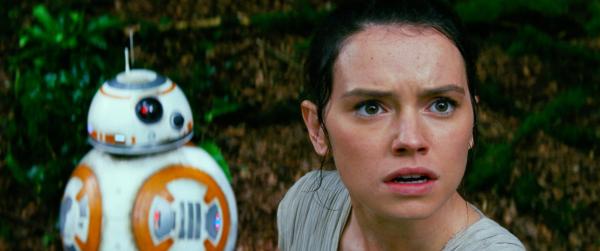
There are a lot of reasons to love Star Wars.
And for the new movie "Star Wars: The Force Awakens" that comes out this weekend, the top reason, at least for Star Wars fans or anyone who has seen the previous movies, might be nostalgia.
Directed by JJ Abrams ("Star Trek"), the new film takes place 30 years after "Star Wars: Return of the Jedi," released in 1983. It stars Daisy Ridley as Rey and John Boyega as Finn, the two new Star Wars heroes who set out on a journey across the galaxy, bringing them together with stars of the original Star Wars trilogy - Han Solo (Harrison Ford), General Leia Organa (Carrie Fisher) and Chewbacca, among others - all the while avoiding the series' new villain, Kylo Ren (Adam Driver), a Darth Vader-like proxy who works alongside the villainous First Order, this movie's group of baddies.
And that's the simple version of the story.
A variety of early reviews of the film that came out Wednesday morning have one overwhelming theme tying them together - the new movie is packed with feelings of nostalgia.
The Washington Post said the movie "gets the nostalgia-novelty mix just right." The Daily Beast said the film had "plenty of deja vu," and New Republic excitedly reported that "the gang's all here," a reference to the characters of the original films returning for this new movie.
"Filled with incident, movement and speed, dusted with light layers of tarnished 'used future' grime, it captures the kinetic energy that made the first film, from 1977, such a revelation to filmgoers who marveled at Lucas's mashup of B movies, Saturday-morning serials, Japanese historical epics and mythic heft," the Post reported.
In a spoiler-free review, Mashable's Chris Taylor similarly points out that the new film not only blends witty dialogue, puppetry and action scenes together, but also finds a way to bring "Star Wars' promise of mystery."
And more than just feeling like the original films, they also look like them, too, the Post reported. Unlike the prequels that came out in the early 2000s, which were more CGI and animation, the new film, like the originals, relies on real sets and puppetry like the originals.
"The Force Awakens" also brings back some of the older characters and actors who were absent in the more recent Star Wars film. The Post's review praised director Abrams for his ability to mesh the old with the new.
"He's gotten the band back together in a perfectly balanced performance of oldies and new riffs, respecting all that's come before but never getting mired in minutiae or fatuous nostalgia," the Post reported.
This is good news for Star Wars fans, especially since nostalgia was (and still is) a big selling point for the new films, as The Atlantic's David Sims noted back in April after one of the movie's new trailers released.
That's because Star Wars fans have been waiting almost 10 years for a new film - and 30 for one that harkens back to the original trilogy, released in the late 1970s and early '80s, Sims wrote. Marketers and Abrams himself relied on nostalgia to bring viewers back and hold their interest.
Research shows that nostalgia has been known to benefit people in a number of ways, The New York Times reported in 2013. The feeling helps people feel less lonely, bored and anxious. It can also increase one's level of generosity and make people more tolerant. Married couples even feel happier with each other when they're being nostalgic about their memories, the Times reported.
But nostalgia also has some negatives - mainly it makes people feel a sense of loss for past events they once enjoyed, the Times reported.
And that was a danger that Sims noted about the new film - people's love for Star Wars might impact how good the film would be, especially since Abrams himself is a self-professed Star Wars fanboy.
"Familiar faces, stormtroopers, X-Wings swooping around, all set to John Williams' score; this is the stuff of nostalgia, not the breath of fresh air the original Star Wars offered in 1977," Sims wrote back in April. "Whatever new formula Abrams might be adding, it's certainly not apparent from the advertising, which is instead designed to remind everyone of the first time they saw Han and Chewie in the Millennium Falcon."
And in fact, the actual film does suffer at points from the nostalgia. As The New Republic's Will Leitch notes in his review, Abrams' use of nostalgia in the movie is mostly "fan service" - of which, there may be too much and, at points, hinders some of the viewing experience, Leitch wrote.
But, Leitch later explains, the film finds a way to avoid too much fan service and shows viewers a world - nay, galaxy - that makes them feel nostalgic without straying away from placing importance on the future stories to come.
"It's a near-perfect bit of alchemy: To create, and re-create, at once," Leitch wrote. "It scratches the itch you've been waiting 30 years to scratch and make sure to get you on the hook for more. It is precisely the Star Wars movie that you want it to be. This is the one you were waiting for. You may be waiting just as intently for the next one."

